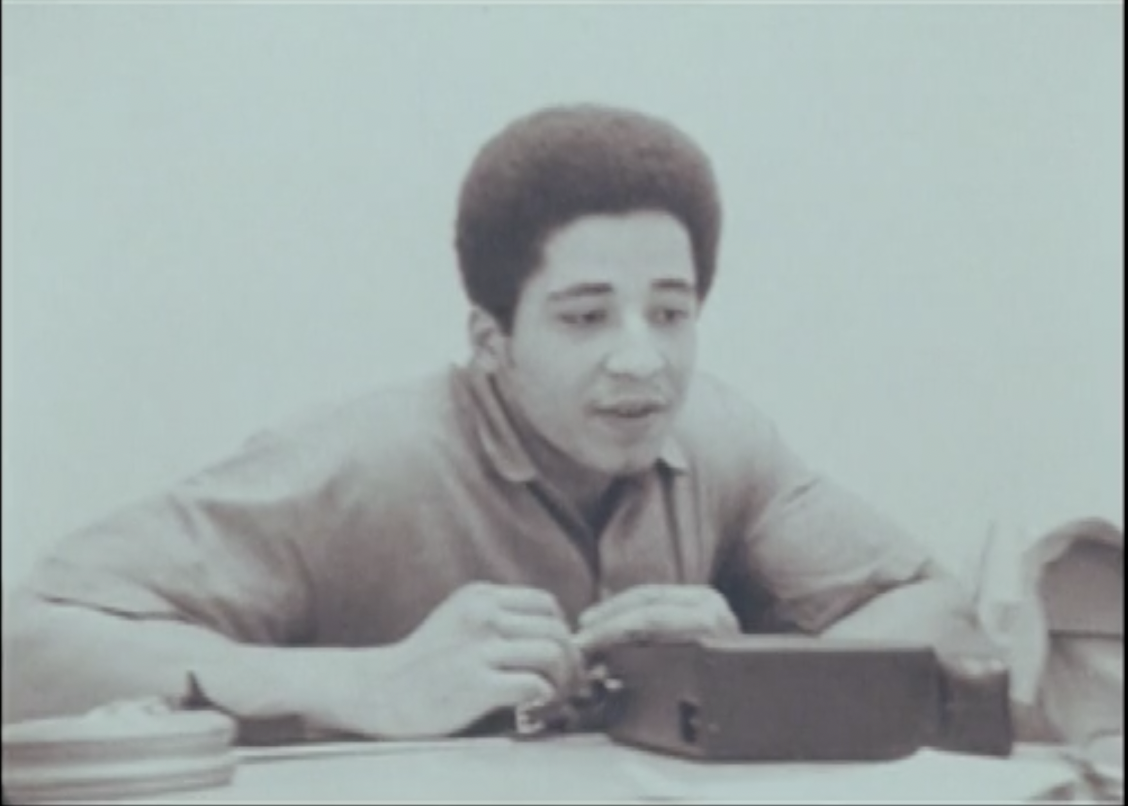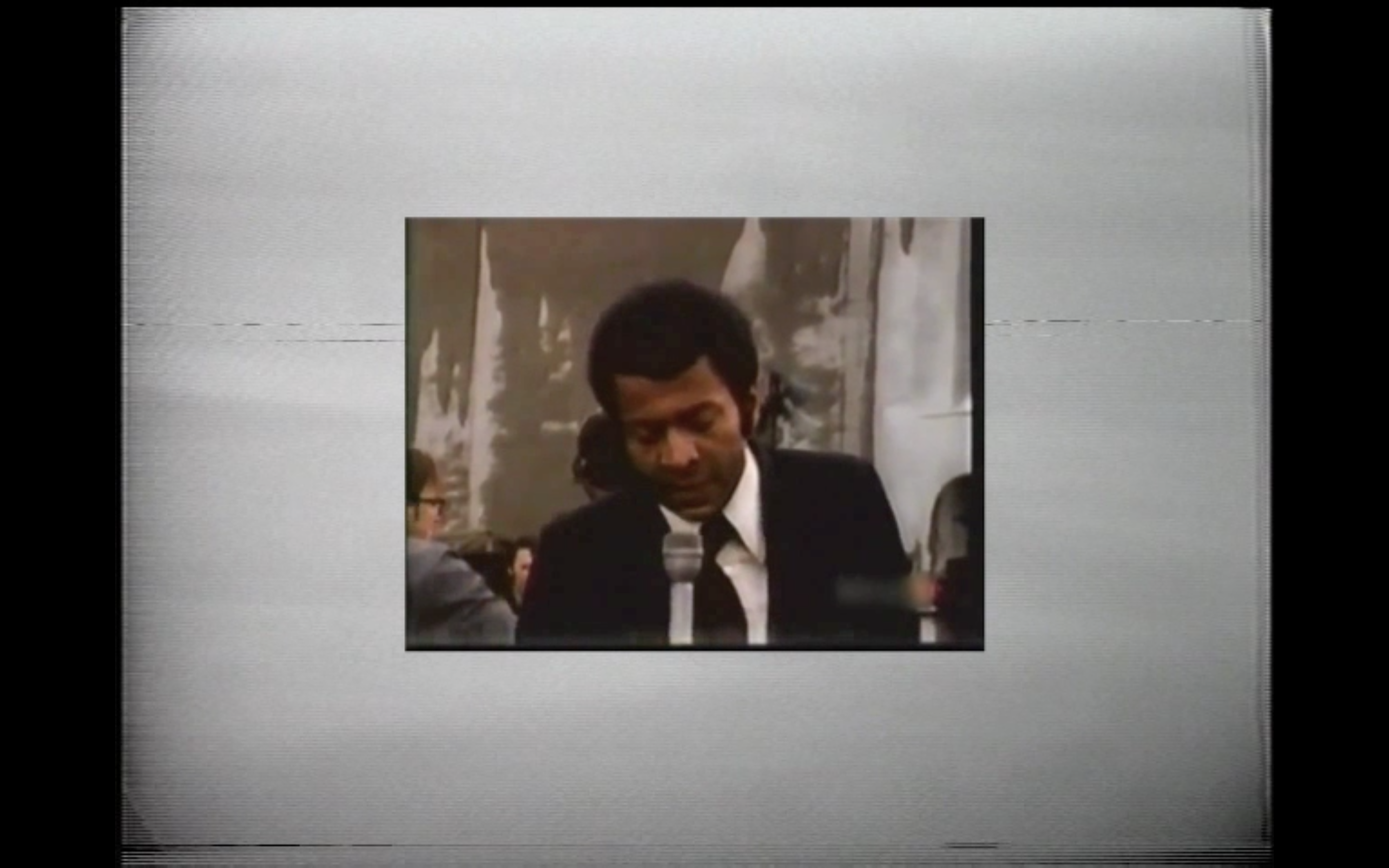Abolition Now! 50 Years of the Attica Prison Uprising
Curated by Emily Apter
Co-presented with Third World Newsreel
In Collaboration with Attica Is All of Us, The Freedom Archives, and the Documentary Forum at CCNY.
Our whole question is: just what level of consciousness will support the violent revolutionary activity necessary to achieve our ends? How will we know when this level is reached? ― George Jackson, Blood in My Eye (1972)
In July of 1971, the Attica Liberation Faction (ALF), a group of organizers incarcerated at the Attica Correctional Facility in Upstate New York, presented 27 demands to the Commissioner of Corrections and Governor Nelson Rockefeller. The ALF had been leading political education classes on Marx, Lenin, de Bois, and Malcolm X, and their demands pushed largely for improved access to health and medical care, cleaner facilities, greater visitation privileges, and better labor protections for all Attica prisoners. They issued their demands peacefully, and were met with neglect and physical violence.
The following month, George Jackson—Black Liberation thinker, writer, and organizer and member of the Black Panther Party—was murdered by San Quentin prison guards. His death sparked a chain-reaction of labor stoppages and prison uprisings across the country. The ALF led a hunger strike in Jackson’s honor, drawing from his revolutionary spirit the strength to mobilize against the oppressive conditions at Attica.
Tensions at Attica escalated, and the prison administration still refused to acknowledge ALF’s demands. From September 9–13th, 1971, 1,200 Attica prisoners seized the prison yard and elected their own democratic leadership. For protection, they took 40 prison guards hostage and invited in outside observers to aid in their negotiations. On September 13th—later known as “Bloody Monday”—the prison warden, under Rockefeller’s direction, ordered State Troopers to suppress the crowd. Troopers fired indiscriminately, killing 43 prisoners and guards. One organizer later described the incident as “premeditated murder.”
Drawing on films made from 1971 to the present day, Abolition Now! 50 Years of the Attica Prison Uprising chronicles, commemorates, and politicizes the events of the 1971 uprising and massacre—tracing George Jackson’s influence—through the nonfiction visual representations that came out of it.
The films in this series (as well as one “audio documentary”) operate within a framework that advances the collective political project of prison abolition. It is not just the content of these films—the organized rebellion of Attica prisoners and the violent repression carried out by the state—that comprises their abolitionist tendency. Rather it is the way they depict the prison as a set of interlocking systems used to subjugate people, extract value, and naturalize racial violence. It is their particular articulation of “visibility” as a dialectical relationship between presence and absence—carcerality as a system that at once requires violence, produces violence, and conceals it.
Cinda Firestone’s ATTICA (1972), for instance, makes clear that only through the ALF’s militant organizing and occupation of the prison yard were press, photographers, activists, legal observers, filmmakers—and, subsequently, us viewers—able to bear witness to the inside conditions of Attica. PRISON IN 12 LANDSCAPES (2016), on the other hand, never sets foot in a prison, and instead illustrates the way precarious labor and profit are used to reproduce the “need” for a prison industry in the first place.
EVIDENCE OF THE EVIDENCE (2018) uses archival police footage of the uprising to reflect more broadly on the role of image-making in historical memory—its ability to uplift movements as well as to surveil them.
TEACH OUR CHILDREN (1971) highlights the continuity of racial oppression, class struggle, colonial domination, and incarceration over time and geography. Malcolm X’s words echo from the film’s start: “Don’t be shocked when I say I was in prison. You’re still in prison. That’s what America means, prison.”
Our hope for this series is to suggest that the power of film lies, yes, in disrupting dominant narratives, denouncing oppression, evoking alternative political realities, and highlighting revolutionary struggle. But, most importantly, to do these things while recognizing the material limits of moving images alone to enact the social and economic transformations we envision.
Our hope is to commemorate the 50th anniversary of the Attica uprising, and to reflect on ongoing resistance efforts against prison slavery and police terror. It’s to memorialize the political prisoners killed by guards and troopers in 1971, and to grieve the many many others killed in the struggle for their, and others’, liberation in the present day. It’s to activate film in the fight for a world beyond policing and imprisonment—a world where justice is non-punitive and healing for all people—and to support organizers on the inside and out in the fight to dismantle the conditions that produce these structures of violence in the first place.
We are grateful for our many collaborators who have generously shared ideas and resources and sharpened our political analysis. With special thanks to JT Takagi, Nathaniel Moore, Andrea Battleground, Inney Prakash, Annie Horner, NYC-DSA Emerge, The Freedom Archives, and Solidarity Cinema.
Live Events:
Please read the Maysles Documentary Center Covid-19 Policies here.
Wednesday, September 8th at 7:30PM EDT in-person screening of Teach Our Children (Susan Robeson & Christine Choy, 1972) at Maysles Cinema. This screening will be followed by a recorded conversation with Christine Choy (Teach Our Children) and JT Takagi (Third World Newsreel).
Friday, September 10th at 8PM EDT Sidewalk Cinema screening of Attica (Cinda Firestone, 1974).
Monday, September 13 at 7PM EDT Live Zoom Panel discussion with Brett Story (The Prison In 12 Landscapes), Alex Johnston (Evidence of the Evidence), and Kevin Steele (Organizer with Root & Branch NYC). Moderated by Niki Franco (Organizer with (F)Empower Miami).
Thursday, September 16th at 7:30PM EDT in-person 16mm screening of Attica (Cinda Firestone, 1974) at Maysles Cinema.
16mm print courtesy of the Reserve Film and Video Collection of the New York Public Library for the Performing Arts. Preservation of this film was made possible by a grant from the Women’s Film Preservation Fund of New York Women in Film and Television.
Friday, September 17th at 8PM EDT Sidewalk Cinema screening of Evidence of the Evidence (Alex Johnston, 2018) Still Attica Remains (Nick Macdonald, 1975). There will be a post-screening Q&A with filmmaker Nick Macdonald.
#VirtualCinema
Teach Our Children
(Christine Choy & Susan Robeson, 1972, 35 min.)
This film focuses on the historic 1971 Attica prison rebellion in upstate New York. It targets the conditions that caused prisoners to take drastic steps toward securing their basic rights. The film questions the reactions of prison warden Oswald, New York governor Nelson Rockefeller and President Nixon, as well as the death of 31 inmates and prison guards from bullets fired by the National Guard. Through on-site footage taken during and following the rebellion, and follow-up interviews with inmates, this film relates a powerful message concerning prisoner's rights and provides an important historical document. A Third World Newsreel production.
Attica
Cinda Firestone, 1974, 80 min.
Social unrest in the United States hit a boiling point on September 9, 1971, when inmates at Attica State Prison—after months of protesting inhumane living conditions—revolted, seizing part of the prison and taking 35 hostages. The uprising resulted in the death of 43 people after troopers were called in to suppress the rioters. Three years later, Cinda Firestone released this monumental investigation of the rebellion and its aftermath, piecing together documentary footage of the occupation and ensuing assault with video from the McKay Commission hearings that criticized Governor Nelson A. Rockefeller’s handling of the incident and firsthand interviews with prisoners discharged after the event.
Unavailable for 33 years, Attica still is a sobering and revealing look into the heart of American justice, weighing the costs of institutional dishonesty and abuses of power against the price some will pay to retain human dignity.
*The original film-to-film preservation of ATTICA was done with support from the Women’s Film Preservation Fund of New York Women in Film & Television.
Still Attica Remains
Nick Macdonald, 1975, 15 min.
A film shot in New York City in one day, on September 13, 1975, the 4th anniversary of the massacre at Attica prison. The narration presents a case that the brutal assault was cold-blooded and senseless, causing an avoidable tragedy.
Handheld footage of the city provides a backdrop as Macdonald recounts the events of the rebellion, focusing in particular on Gov. Nelson Rockefeller’s refusal to negotiate and his role in escalating the conflict that resulted in 43 deaths. Both a screed against political power and a memorial to those who lost their lives, Still Attica Remains details some of the horrors of prison— unfortunately relevant today as it was in 1975.
George Jackson/San Quentin Prison
1972, 28 min.
Courtesy of The Freedom Archives 1972, 28 min.
This extraordinary video is from a 16mm film “work print” made in 1971–1972, and includes interviews with George Jackson, Georgia Jackson (George and Jonathan Jackson’s mother) and Angela Davis, while she was still in the Marin County Courthouse Jail, before her acquittal. We have not been able to identify the other prisoners. As you will see, the film has no titles or other credits. The discovery of such amazing, previously unknown historic materials always leaves us thrilled and in awe, deepening our understanding of those times and affirming the mission of the Freedom Archives.
Evidence of the Evidence
Alex Johnston, 2018, 20 min.
The 1971 Attica prison uprising is a signature moment of radical resistance for the American Civil Rights movement. The bloody retaking of the prison however, is an open wound. Utilizing rarely seen video recordings, Evidence of the Evidence explores this tortured history. It offers a visceral account of the events at Attica, and chronicles the mediation and narrativization of these events. In so doing, it reflects on the role that moving images play in the production of history and memory, its creation and its destruction.
The Prison In 12 Landscapes
Brett Story, 2016, 90 min.
More people are imprisoned in the United States at this moment than in any other time or place in history, yet the prison itself has never felt further away or more out of sight. The Prison in Twelve Landscapes is a film about the prison in which we never see a penitentiary. Instead, the film unfolds as a cinematic journey through a series of landscapes across the USA where prisons do work and affect lives, from a California mountainside where female prisoners fight raging wildfires, to a Bronx warehouse full of goods destined for the state correctional system, to an Appalachian coal town betting its future on the promise of prison jobs.
With support from Cinereach, Vital Projects Fund, the Canada Council for the Arts, the Toronto Arts Council, the Ontario Arts Council, and the National Film Board of Canada.
Prisons on Fire: George Jackson, Attica, and Black Liberation [Digital Album]
Produced by Anita Johnson, Claude Marks, and The Freedom Archives.
Originally released in 2001. Re-released June 11, 2020
All the historical materials are from the Freedom Archives collections.














